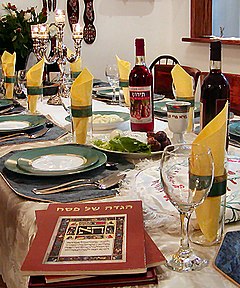**1. Passover Etymology and Origins:**
– The term ‘Pesach’ derives from the Hebrew root meaning ‘to have pity.’
– ‘Passover’ is a literal translation of the Hebrew term.
– The term may refer to the Passover sacrifice.
– Scholars suggest the ritual’s origins in an apotropaic rite.
– The Exodus narrative merged with the Canaanite agricultural festival.
**2. Passover Ritual and Biblical Narrative:**
– Passover is a mitzvah commanded by the Torah.
– Instructions include marking doors with lambs’ blood for protection.
– Disposal of leavening is required before the festival.
– The ritual ensures the protection of a family home.
– The Exodus story involves the 10 plagues and the death of the first-born.
**3. Passover in Religious Texts:**
– Festival of matzot and Passover commandment mentioned in the Hebrew Bible.
– Specific places for sacrifices prescribed by God.
– Emphasis on remembering in biblical commandments.
– King Josiah restores Passover celebration in Judah.
– Extra-biblical sources mention leaven removal and lamb sacrifices.
**4. Passover Observance and Traditions:**
– Passover begins on the 15th day of the month in the Hebrew calendar.
– Matzah consumption and Seder meal with symbolic foods.
– Significance of the Passover lamb and retelling the Exodus story.
– Restrictions on leavened products during Passover.
– Passover observed worldwide with various customs and rituals.
**5. Passover Modern Observance:**
– Jewish communities worldwide observe Passover.
– Importance of family gatherings and Passover seders.
– Passover services in synagogues.
– Duration of Passover and associated traditions.
– Yom tov sheni shel galuyot associated with Passover.
Passover, also called Pesach (/ˈpɛsɑːx, ˈpeɪ-/; Biblical Hebrew: חַג הַפֶּסַח, romanized: Ḥag haPesaḥ, lit. 'Pilgrimage of the Passing Over'), is a major Jewish holiday, one of the three pilgrimage festivals, that celebrates the Biblical story of the Israelites' escape from slavery in Egypt. The Passover ritual is thought by modern scholars to have its origins in an apotropaic rite, unrelated to the Exodus, to ensure the protection of a family home.
| Passoverחַג הַפֶּסַח | |
|---|---|
 A table set up for a Passover Seder | |
| Official name | Pesach – פסח (in Hebrew) |
| Type | Jewish (religious and cultural) |
| Significance |
|
| Celebrations | Passover Seder |
| Begins | 15 Nisan |
| Ends | 21 Nisan (22 Nisan in traditional Diaspora communities) |
| Date | 15 Nisan, 16 Nisan, 17 Nisan, 18 Nisan, 19 Nisan, 20 Nisan, 21 Nisan, 22 Nisan |
| 2023 date | Sunset, 5 April – nightfall, 13 April (8 days) |
| 2024 date | Sunset, 22 April – nightfall, 30 April (8 days) |
| 2025 date | Sunset, 12 April – nightfall, 20 April (8 days) |
| 2026 date | Sunset, 1 April – nightfall, 9 April (8 days) |
| Related to | Shavuot ("Festival of Weeks") which follows 49 days from the second night of Passover. |
According to the Book of Exodus, God (Yahweh) commanded Moses to tell the Israelites to mark a lamb's blood above their doors in order that the Angel of Death would pass over them (i.e., that they would not be touched by the tenth plague, death of the firstborn). After the death of the firstborn, Pharaoh ordered the Israelites to leave, taking whatever they want, and asked Moses to bless him in the name of the Lord. The passage goes on to state that the Passover sacrifice recalls the time when God "passed over the houses of the Israelites in Egypt". This story is recounted at the Passover meal during the first two evenings of Passover by reading the Haggadah. The Haggadah is a standardized ritual account of the Exodus story, in fulfillment of the command "And thou shalt tell [Higgadata] thy son in that day, saying: It is because of that which the LORD did for me when I came forth out of Egypt."
Pesach starts on the 15th day of the Hebrew month of Nisan which is considered the first month of the Hebrew year. The Hebrew calendar is adjusted to align with the solar calendar in such a way that 15 Nisan always coincides with Sunday, Tuesday, Thursday, or Saturday. The Hebrew day starts and ends at sunset, so the holiday starts at sunset the day before. For example, in 2023, 15 Nisan coincides with Thursday April 6. Therefore, Pesach starts at sundown Wednesday April 5. The word Pesach or Passover can also refer to the Korban Pesach, the paschal lamb that was offered when the Temple in Jerusalem stood; to the Passover Seder, the ritual meal on Passover night; or to the Feast of Unleavened Bread. One of the biblically ordained Three Pilgrimage Festivals, Passover is celebrated for seven days in Israel and for eight days among the Jewish diaspora, based on the concept of yom tov sheni shel galuyot. In the Bible, the seven-day holiday is known as Chag HaMatzot, the feast of unleavened bread (matzah). The omer offering was offered at Jerusalem on the second day of the festival. The counting of the omer is still practiced, for seven weeks until the 50th day, which is the holiday of Shavuot.
Nowadays, in addition to the biblical prohibition of owning leavened foods for the duration of the holiday, the Passover Seder, at which the Haggadah is read aloud, is one of the most widely observed rituals in Judaism.
